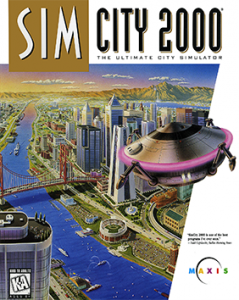730th played so far
Genre: Management Simulation
Platform: Various
Year of Release: 1993
Developer: Maxis
Publisher: Maxis
I’ve been playing a fair amount of Cities: Skylines recently, the spiritual successor to the, by now semi-defunct, SimCity series. It’s one of those series I love playing and I’ve been holding off on playing them so I have a chance to savour them later. We covered the first SimCity over five years ago – back when this was a shared blog – and it still felt a bit primitive then.
SimCity 2000 was my first introduction to the franchise, though, and I’m expecting to enjoy it a lot again. If nothing else, we’ll still be close enough to get quite a bit out of it.
Our Thoughts
You can approach these older games in two ways – you can judge them trying to take them in the context of their time, trying to separate them from what follows, or compare them and see how they would fare now. In the latter category, SimCity 2000 has some issues. Aside from a lot more repeated buildings, abandonment seemed random, information about your city seemed difficult to obtain, and building certain things was unintuitive – a highway was far more difficult to set up than it had any right to be, being too fiddly. Sticking to a grid made sense at the time, but it constrains your gameplay far enough that it made the world feel smaller and more awkward. And while unlocking based on a date makes historical sense, having unlocks based on progress works better on training you, or unlocking everything from the start makes it easier to just plan what you do. Accuracy doesn’t necessarily matter much.
On the other hand, the magic of building a city is still there. You need to learn the rules – never build anything more than three squares away from a road, making sure power and electricity is build – but then you can build a city the way you want. A “no money” sandbox mode would be nice, but the game’s old enough that there are ways around that. Traffic density might just be cars going in loops, but it works to make the city feel busier. There are a lot of different buildings and systems that are at play to make your city feel more real. Maybe they don’t always interact as much as they should, but it’s there. And there are plenty of disasters to deal with.
The game is also fairly simple. Put down areas, things build. You need to spend a bit of time on getting the other resources in place, but it feels liek there’s always something to do and more to move on. It’s always extremely satisfying, which is part of what matters here.
Final Thoughts
Sure, this version of SimCity is dated and if you wanted to play more, you should probably play a later edition. At the same time, the isometric play, semi 3D and improvements on the original game feel like they set the real standard, and for me it’s still the defining version of the series, that everything else really built on.

[…] this fifty there was SimCity 2000, the well known city builder and the version I started with. It’s dated, sure, and I […]